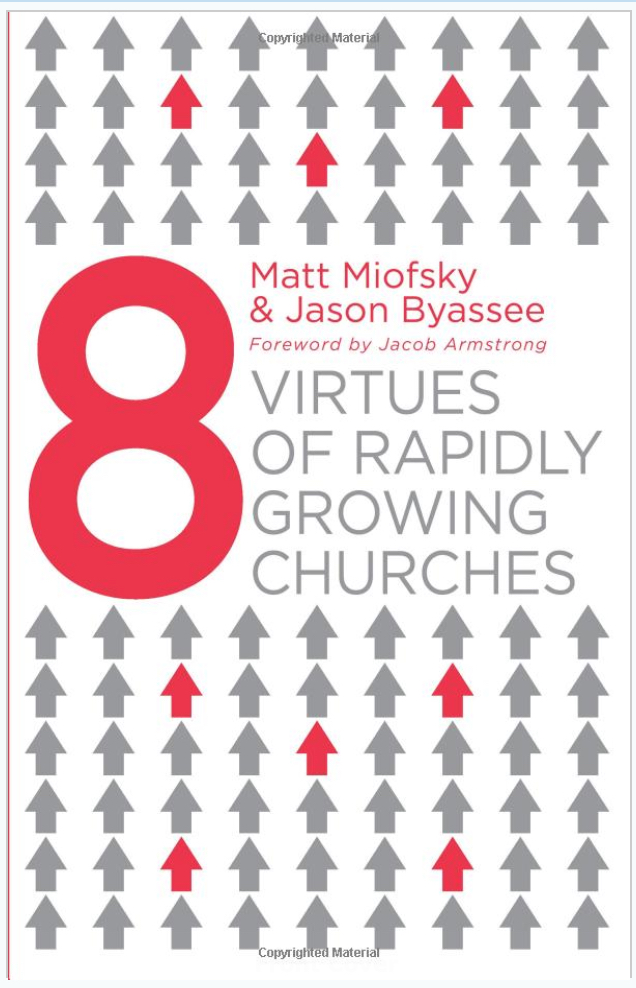Book review: 8 Virtues of Rapidly Growing Churches
 ChatGPT
ChatGPT In this 110-page book, Eight Virtues of Rapidly Growing Churches, from Abingdon Press (2018), Matt Miofsky, founding lead pastor of The Gathering in British Columbia reveal eight virtues of rapidly growing churches.
In this 110-page book, Eight Virtues of Rapidly Growing Churches, from Abingdon Press (2018), Matt Miofsky, founding lead pastor of The Gathering in British Columbia reveal eight virtues of rapidly growing churches.
These rapidly growing churches believe in miracles and act accordingly; integrate new people quickly; love the local; exist to reach the next person; elevate the practice of giving; work in teams; preach well to the skeptic; and make friends with the denomination.
The authors make this premise in the introduction: “A church is not a recipe or a template or a blueprint. It is a mystery. A participant in the mystery of the resurrected and living Christ. We disgrace a mystery when we treat it like a formula to be copied. Instead, we should stand in awe of a mystery: admire it, ponder what we stand to learn about God from it, speak about it to others.”
As you continue to read: “There is a mystery to churches that grow. Some good and faithful pastors do their best, and things come unglued. Some (though this is less common) poor pastors are just in the right place at the right time, and things grow. Not all growth is healthy. Tumors grow—sometimes fast. Epidemics and scandals too. Churches that grow aren’t ipso facto faithful, and churches that are faithful don’t ipso facto grow.”
It seems that these authors are also tough on their own Methodist tradition in the course of the book: “Methodism is a revivalist movement. If we, of all God’s church, are not reviving anybody, then what are we there for?...There is a complex history behind why and how Methodism went from sawdust trails and backwoods revivals into downtown corner buildings with tall steeples and gothic architecture and endowments.”
Methodism has been hitting the “sawdust trails” once again in discovering their mission and identity. Don’t mistake this small book as just for Methodists. Its wisdom applies to each and every faith and denomination. It deals with the lead pastor and those pastors under that leadership and their ministry together.
“Methodism at its best is a tradition that encourages Christians to ‘watch over one another in love.’ The pastor and number two at these churches [in the surveyed churches that form the basis for the eight virtues] do precisely that. They care about one another’s souls, marriages, discipleship, and leadership—in something of that order.
“Each of these folks started at the church as a worshiper before they worked for the place. Each was attracted to the church’s vision for the kingdom of God, for human flourishing generally, for the blessing of the neighborhood. And each gave something up to jump in professionally.”
The chapter about relating to the denomination of which you are a part and working cooperatively with the larger church is exceptionally well done, for too many congregations, as they grow and thrive, act like they are a denomination themselves. The “system” gets in the way. “Oftentimes, it seems that these pastors want money, freedom, and autonomy without any of the accountability.”
This is an excellent book for long flights or even inspiration for your next sabbatical. Don’t mistake the book’s brevity for lack of thoughtfulness or helpfulness.
More on Book Reviews
- Book review: Building a Storybrand (by Richard Blackaby)
- Book review: He Leadeth Me (by Richard Blackaby)
- Book review: Rare Leadership: 4 Uncommon Habits for Increasing Trust, Joy, and Engagement in the People You Lead (by Richard Blackaby)
- Book review: Shaping History Through Prayer and Fasting, by Derek Prince (by Richard Blackaby)


